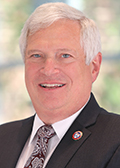From the Provost and EVP: A Message to the Penn Community on the Fiscal Year 2021 Budget
June 16, 2020
As we approach the final weeks of the current fiscal year, we are writing to update you on the financial challenges presented by COVID-19. Our principal goal is to provide transparency into the fiscal realities and uncertainties we must confront as a community. Last week, the Board of Trustees approved the operating budgets and capital plans for Fiscal Year 2021. We write today to share a summary of the financial information provided to the Board of Trustees.
The University is forecasting a budget deficit of $91 million for Fiscal Year 2021. The deficit stems from several revenue uncertainties including student enrollment and research funding along with reductions in housing occupancy and dining services as well as commercial revenue from our hotels, retail and other support enterprises. Concurrently, we are anticipating increased demand for financial aid due to the economic fall out from the pandemic.
To respond to these challenges, we will need to continue the measures we adopted in the Spring related to compensation, discretionary spending and capital spending. In addition, later this week, we will be asking all administrative centers to reduce their budgets by 5%. Schools are also being asked to reduce unrestricted expenditures.
In considering ways to reduce discretionary spending, we are advising leadership to first focus on current expense (i.e., travel, meals, supplies and professional services.) We want to exhaust those possibilities prior to consideration of reductions to our workforce.
Over the past few months, we have received a number of excellent questions regarding our financial status. We are sharing responses to those questions with you, as well as anticipating other questions that members of the community may have in the FAQ below.
Looking Ahead
The talent, dedication, hard work and collaborative spirit of our Penn community of faculty, researchers, staff and alumni make us an eminent national and global university. The critical steps we take right now are necessary to sustain our mission of world-class teaching, research, clinical care and service to society. Keeping Penn’s core mission front and center is especially crucial as the pandemic has reinforced the vital role of universities and academic-based medical centers such as Penn in our modern world. As the pandemic poses a set of formidable challenges to all colleges and universities, our strong and collaborative Penn community will continue to rise to meet this moment.
Please stay safe, and we will look forward to providing future updates.
FAQ on the Fiscal Year 2021 Budget
What has been the financial impact to date on the University?
In March, the threat of COVID-19 shut down both our campus and our city. Undaunted in continuing our missions, we depopulated campus and pivoted to remote learning and work. These actions resulted in an unplanned impact of $47 million in the current fiscal year as we provided eligible students with housing and dining rebates and assisted in transportation and relocation costs; returned students from semester abroad programs; invested in technology and infrastructure to facilitate remote learning; provided financial assistance to eligible Penn staff and contracted workers; abated rent for certain tenants within Penn’s retail portfolio; made grants to small businesses in West Philadelphia and non-profit agencies across the city; reconfigured labs; and made other investments, large and small, that created a protective public health environment across campus. Simultaneously, we experienced revenue losses from closing retail establishments, performing arts centers, and museums; providing free access to parking garages; and cancelling athletic events and summer camps, among other impacts.
Won’t the University’s “unplanned expenses” be offset by other reductions in current expenses?
We are deeply grateful for and impressed by how rapidly all members of the Penn community have responded to our requests to curtail discretionary spending (https://coronavirus.upenn.edu/announcement/message-summer-programming-and-budget-considerations-fiscal-year-2021). For example, the adherence to travel restrictions has resulted in a dramatic reduction in travel-related expenditures. We have also seen reductions in other costs, such as utilities (from reduced occupancy) and other forms of current expense. Yet our single largest cost—compensation—has remained steady, as the vast majority of full and part time employees, as well as most temporary employees, have remained in full pay status. In sum, these expenditure reductions have helped to reduce the blow from the revenue reductions, but there is no windfall resulting from our reduced presence on campus.
What has been the financial impact to date on Penn Medicine?
The numbers included in this message only address the academic component of the University. As EVP J. Larry Jameson and CEO Kevin Mahoney have shared with Penn Medicine leadership, the COVID-19 pandemic constrained clinical activity, significantly reducing both current and future financial performance at the Health System. There were substantial revenue losses due to decanting of the hospitals in preparation for COVID-19, along with a rise in expenditures for necessary protective equipment. While a recovery plan is underway, the Health System, which provides valuable support to the Perelman School of Medicine, is forecasting margins at half of its historical levels. The Health System will face ongoing financial challenges until clinical activity returns to normal in outpatient and to hospital-based settings and there will likely be reimbursement challenges resulting from the sharp rise in unemployment in the region. Further financial information will be provided to the Penn Medicine community as results are available at the end of this fiscal year and after the first quarter of FY21.
Will Penn achieve a balanced budget in the current fiscal year?
Thanks to the rapid efforts by everyone to reduce expenditures, we expect the University to finish slightly above breakeven for the year, but below our original budget.
What has been the impact of cost containment measures?
In April, as we planned the budget for FY21, we forecast a substantial deficit. We quickly implemented cost containment strategies, including implementing a freeze on hiring new positions, curtailing merit increases for FY21, slowing planned capital spending, and dramatically reducing travel, entertainment, and discretionary spending. These preemptive actions proved effective, as the forecast FY21 deficit decreased by approximately one third, declining from $148 million to $91 million.
What are the factors driving the Fiscal Year 2021 deficit?
Several factors will contribute to the University’s financial health in the coming year. There are many unknowns at this point, but potential factors include: reduction in the size of our enrolled student body, decrease in housing and dining plans, decreased funding for our research operations, reductions in ancillary income stemming from a variety of independent and support operations, and revenue loss from campus events. Conversely, we have recently increased the financial aid budget, as students and their families face economic pressure stemming from the negative impact of the pandemic. Student aid is one of our highest priorities, and so our aid budget increases according to the needs of our student population.
What additional measures will be taken to address the deficit?
First, we must clarify the $91 million projected budget deficit. Included within this projection are approximately $40 million of one-time, non-recurring expenditures related to COVID-19 preparation and impact as well as anticipated increases in student aid. For example, we previously announced the waiver of the summer earnings requirement for all aided undergraduates for the summer of 2020. When factoring in these one-time, non-recurring costs, the net deficit is $50 million.
To address the forecasted deficit, we will need to continue the measures announced in March related to compensation, discretionary spending and capital. However, we will need to take additional action in order to realign our spending with revenues. We are directing each school, administrative center, and resource center to reduce FY21 expenses with an overall target of $50 million. The primary objective is a reduction in discretionary spending across the board. Even though salaries and benefits make up 60% of our expenses, this will be the last area we target for expense reductions. Instead, we are asking that every area of the University reduce spending on travel, entertainment, outside professional service contracts in management consulting, marketing, legal and accounting, event sponsorships, memberships and subscriptions, just to name a few. Much can be gained by curtailing these discretionary expenses. We sincerely hope that these cuts are all that is required to close the deficit.
We recognize and appreciate the actions taken to date by many Schools and Centers to address their specific financial challenges.
Will the University enact layoffs?
Part of what makes Penn special for our wonderful faculty and students is our exceptional staff: our custodians, research lab technicians, dining workers, office professionals, safety officers, and skilled trades and grounds staff, to name just a few. We are a community, and we have done everything we can to keep our community together. While we truly wish that we could say with certainty that there will be no furloughs or layoffs, there is, unfortunately, too much about the future that we simply do not know. What we do know is that, when we make decisions about our collective future, the welfare of our employees will remain a critically important factor.
The Division of Human Resources has developed guidance and enhanced options for School and Center leadership to enable both voluntary and involuntary separations and furloughs. As the impact of COVID-19 is uneven across the University, each School and Center will need to develop a plan that addresses its unique circumstances.
How will the deficit impact capital construction on campus?
Every approved capital project at the University is required to a fully defined funding plan when initiated. As a result, capital projects currently underway will continue. In addition, we have maintained the current level of facilities renewal funding to continue to invest in the maintenance of our physical plant.
In March, central administration requested all Schools and Centers reevaluate their capital plans in light of the new environment. The FY21 Capital Plan was revised downward to $238 million, a 60% decrease. Remaining projects on the FY21 Plan are strategic priorities, infrastructure, and enabling projects. New feasibility and design studies not currently underway will not proceed at this time.
Why can’t we tap the endowment to address the deficit?
First, it is important to know that endowment spending is helping Penn to address the deficit. Penn’s endowment spending will grow by 3.7% in the FY 21 budget—the largest revenue growth in the FY21 budget—based on the University’s current spending policy.
Second, the endowment plays a critically important role in both supporting Penn today and sustaining it into the future. Comprised of philanthropic donations, and existing as several thousand smaller and permanent funds that are designated for specific purposes, the endowment provides ongoing support over the long life of the institution. It is a source of funding over time for critical priorities from teaching, research, and financial aid to health care, libraries, and athletic programs. About one quarter of Penn’s endowment directly supports the Health System, a high level relative to peer institutions. All these programs depend on endowment funding both today and into the future.
While temporarily increasing endowment spending may sound like an easy solution, strong constraints govern its spending. These constraints are designed to sustain the University’s mission over time. Distinct from a personal “rainy day” savings account, every dollar of Penn’s endowment is already earmarked for either current or future spending. The key is finding the right balance.
Endowment spending is growing in next year’s budget in order to support today’s Penn community, which bears the brunt of the current crisis. At the same time, we must be sure not to take so much from future spending that we weaken rather than strengthen the University in the years to come.
Yet another important consideration is that our endowment spending is also constrained by legal obligations that Penn must fulfill. By law, endowment funds must benefit the specific school, center, program, and health system originally identified by donors at the time of their gifts. In addition, state law further governs how much can be spent over particular periods of time.
By striking the right balance between present and future, we will sustain Penn through the uncertainty that lies ahead. Given Penn’s mission and our contribution to the strength of our community, society and world, prudently balanced endowment spending has never been more important.
What if I have ideas or suggestions on ways for Penn to save money?
We welcome any constructive suggestions or ideas for Penn to conserve its resources during these uncertain times. Please send an email to either provost@upenn.edu or evp@upenn.edu
—Wendell Pritchett, Provost
—Craig R. Carnaroli, EVP

 Provost Wendell Pritchett announced the appointment of Beth Winkelstein as Deputy Provost effective July 1. “Beth Winkelstein has become one of our most essential leaders of teaching, learning and student life, since she began her tenure as Vice Provost for Education five years ago,” said Provost Pritchett. “Her insight and energy enhance every part of our campus. She leads both undergraduate and graduate education, collaborating with deans, faculty leaders and the Office of the Vice Provost for University Life, as well as the Council of Undergraduate Deans, Council of Graduate Deans, Graduate Council of the Faculties and Council of Professional Master’s Degree Deans.
Provost Wendell Pritchett announced the appointment of Beth Winkelstein as Deputy Provost effective July 1. “Beth Winkelstein has become one of our most essential leaders of teaching, learning and student life, since she began her tenure as Vice Provost for Education five years ago,” said Provost Pritchett. “Her insight and energy enhance every part of our campus. She leads both undergraduate and graduate education, collaborating with deans, faculty leaders and the Office of the Vice Provost for University Life, as well as the Council of Undergraduate Deans, Council of Graduate Deans, Graduate Council of the Faculties and Council of Professional Master’s Degree Deans. The Basic Science Award
The Basic Science Award The Robert E. DeRevere Award
The Robert E. DeRevere Award The Joseph L. T. Appleton Award
The Joseph L. T. Appleton Award The Earle Bank Hoyt Award
The Earle Bank Hoyt Award The Senior Outstanding Teaching Award
The Senior Outstanding Teaching Award Nia Akins, one of the greatest athletes in Penn history, has been named an Indoor Track & Field All-American by the US Track & Field and Cross Country Coaches Association.
Nia Akins, one of the greatest athletes in Penn history, has been named an Indoor Track & Field All-American by the US Track & Field and Cross Country Coaches Association. James Primosch, professor of music in Penn’s School of Arts and Sciences, received the 2020 Virgil Thomson Award in Vocal Music. The award, endowed by the Virgil Thomson Foundation and administered by the American Academy of Arts and Letters, recognizes an American composer of vocal works and includes a prize of $40,000.
James Primosch, professor of music in Penn’s School of Arts and Sciences, received the 2020 Virgil Thomson Award in Vocal Music. The award, endowed by the Virgil Thomson Foundation and administered by the American Academy of Arts and Letters, recognizes an American composer of vocal works and includes a prize of $40,000. Penn Dental Medicine Dean Mark S. Wolff has been recognized for his research by the International Association for Dental Research (IADR) and American Association for Dental Research (AADR) as a recipient of the 2020 IADR/AADR William J. Gies Award for clinical research. The Gies Awards are presented annually in three categories—biological research, biomaterials and bioengineering research, and clinical research—for the best papers published in the IADR/AADR’s Journal of Dental Research. The Gies Awards are named for William J. Gies, the journal’s founder.
Penn Dental Medicine Dean Mark S. Wolff has been recognized for his research by the International Association for Dental Research (IADR) and American Association for Dental Research (AADR) as a recipient of the 2020 IADR/AADR William J. Gies Award for clinical research. The Gies Awards are presented annually in three categories—biological research, biomaterials and bioengineering research, and clinical research—for the best papers published in the IADR/AADR’s Journal of Dental Research. The Gies Awards are named for William J. Gies, the journal’s founder. Associate Professor Aaron Wunsch of the Graduate Program in Historic Preservation in Penn’s Weitzman School of Design has been awarded the Peterson Fellowship from the Athenaeum of Philadelphia in support of his work on Parceling the Picturesque: Landscape, Literature, and Urban Life in Philadelphia’s Laurel Hill Cemetery. The fellowship supports projects related to the study, recording and preservation of early American architecture and building technology.
Associate Professor Aaron Wunsch of the Graduate Program in Historic Preservation in Penn’s Weitzman School of Design has been awarded the Peterson Fellowship from the Athenaeum of Philadelphia in support of his work on Parceling the Picturesque: Landscape, Literature, and Urban Life in Philadelphia’s Laurel Hill Cemetery. The fellowship supports projects related to the study, recording and preservation of early American architecture and building technology.